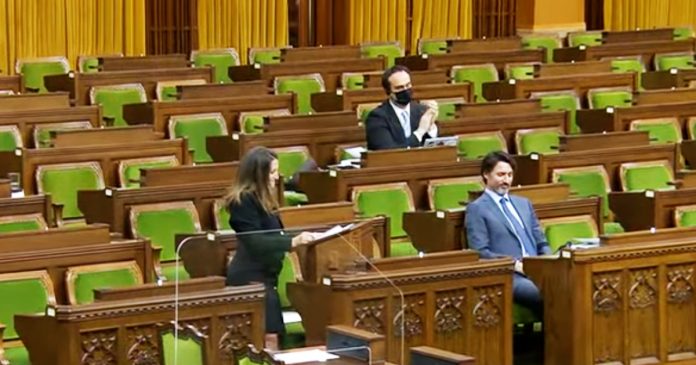The Liberal government unveiled over $100 billion in new spending in its first federal budget since 2019.
Included in the lengthy budget was a series of new measures meant to aid recovery from the COVID-19 pandemic, including a $30 billion investment towards developing a national child-care plan and over $17 billion in environmental spending.
Tory leader Erin O’Toole criticized the government’s rampant spending, saying Canada needs to get its economy back on track with balanced books.
“We need a plan to get back to fiscal balance,” said O’Toole in a press conference on Monday.
“The Conservatives have a plan to do that over the next decades, so we don’t burden our children and grandchildren with out-of-control debts. That’s what seems to be Mr. Trudeau’s intention. We’ll see if there’s any sort of plan for balance today.”
The budget, entitled “A Recovery Plan for Jobs, Growth, and Resilience,” projects a deficit of $354.2 billion for the 2020-2021 fiscal year and a $154.7 billion deficit next year.
Finance Minister Chrystia Freeland called it a “responsible” and growth-oriented plan.
“This budget is a smart, responsible, ambitious plan for jobs and growth, that is designed precisely to heal the specific wounds of the COVID-19 recession and to permanently strengthen Canada’s economic muscle,” Freeland said.
Part of the 2021 budget includes a $12 billion extension to COVID-19 aid programs meant to help small businesses suffering as a result of the pandemic. Meanwhile, the Liberals also hope to extend COVID-19 rent and wage subsidies which were supposed to expire this June.
The Liberals also proposed a new tax meant to target Canada’s ultra-rich. The tax would apply to the sales of luxury cars, boats and personal jets meant for personal use.
“The tax would be calculated at the lesser of 20 per cent of the value above the threshold ($100,000 for cars and personal aircraft, $250,000 for boats) or 10 per cent of the full value of the luxury car, boat, or personal aircraft. This measure would come into force on January 1, 2022,” read the budget.
Other taxation measures include a possible tax on vaping products and mention of an increase to excise duties by $4 per carton on tobacco products with the hope of generating $2.1 billion in revenue over five years.
The Liberals also proposed a Digital Services Tax applicable to 3% “on revenue from digital services that rely on data and content contributions from Canadian users.”
Currently, the federal debt is expected to cross the $1.3 trillion mark.
